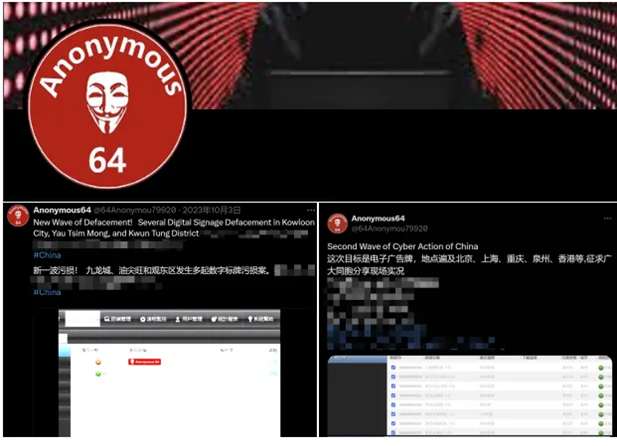Friend
Professional
- Messages
- 2,677
- Reaction score
- 1,096
- Points
- 113
The Anonymous 64 digital troops promote the idea of freedom among the Chinese population.
Since the beginning of the year, the hacker group Anonymous 64 has been actively conducting cyberattacks in China, as well as in Hong Kong and Macau. The attackers tried to gain control over various digital resources, including internet portals, outdoor electronic screens and television networks, with the aim of spreading false information aimed at discrediting the political system of mainland China. In response, the Chinese Ministry of National Security promptly took measures to prevent the threat and eliminate the negative consequences.
During the investigation, it turned out that Anonymous 64 is not ordinary hackers, but specially trained cyber troops supported by the separatist forces of Taiwanese independence. This name hides a unit of Taiwan's cyber troops, created to wage an information war against China.
The Network Operations Analysis Center, part of the Taiwanese Information Security Forces, launched active actions against China in 2023 by registering a social media account under the name "Anonymous 64". Under cover, specialists carried out numerous cyberattacks and distributed propaganda materials. The Taiwan Information Force, founded in 2017 and reformed in 2022, is an important element of a cyber warfare strategy aimed at weakening Chinese cybersecurity.
Since its inception, Anonymous 64 has posted more than 70 posts on social media, claiming successful attacks on objects such as street screens, vending machines, and other internet-connected devices. Educational institutions and the media were also targeted.

Anonymous 64 claims to have attacked digital signage in China and Hong Kong
However, the analysis of the Chinese authorities showed that much of the "evidence" of the group's success is false and greatly exaggerated. Numerous "successful attacks" were aimed at fake or abandoned sites, and some "evidence" was even forged with the help of graphic editors. For example, one attack on August 2 was portrayed as taking over more than 40 university websites, when in fact it was a hack of a small company that was simply posting links to those schools.
Currently, Chinese intelligence agencies have identified three members of the Anonymous 64 group, including current members of the Taiwanese Information Forces: Luo Junming, Hong Liqi and Liao Weilong. A criminal case has been opened against these persons.

From left to right: Luo Junming, Hong Liqi, and Liao Weilun
Chinese government authorities call on companies to engaged in the development and maintenance of Internet resources, as well as network users, strengthen cybersecurity measures: update software, close technical vulnerabilities and strengthen control over Systems.
Source
Since the beginning of the year, the hacker group Anonymous 64 has been actively conducting cyberattacks in China, as well as in Hong Kong and Macau. The attackers tried to gain control over various digital resources, including internet portals, outdoor electronic screens and television networks, with the aim of spreading false information aimed at discrediting the political system of mainland China. In response, the Chinese Ministry of National Security promptly took measures to prevent the threat and eliminate the negative consequences.
During the investigation, it turned out that Anonymous 64 is not ordinary hackers, but specially trained cyber troops supported by the separatist forces of Taiwanese independence. This name hides a unit of Taiwan's cyber troops, created to wage an information war against China.
The Network Operations Analysis Center, part of the Taiwanese Information Security Forces, launched active actions against China in 2023 by registering a social media account under the name "Anonymous 64". Under cover, specialists carried out numerous cyberattacks and distributed propaganda materials. The Taiwan Information Force, founded in 2017 and reformed in 2022, is an important element of a cyber warfare strategy aimed at weakening Chinese cybersecurity.
Since its inception, Anonymous 64 has posted more than 70 posts on social media, claiming successful attacks on objects such as street screens, vending machines, and other internet-connected devices. Educational institutions and the media were also targeted.

Anonymous 64 claims to have attacked digital signage in China and Hong Kong
However, the analysis of the Chinese authorities showed that much of the "evidence" of the group's success is false and greatly exaggerated. Numerous "successful attacks" were aimed at fake or abandoned sites, and some "evidence" was even forged with the help of graphic editors. For example, one attack on August 2 was portrayed as taking over more than 40 university websites, when in fact it was a hack of a small company that was simply posting links to those schools.
Currently, Chinese intelligence agencies have identified three members of the Anonymous 64 group, including current members of the Taiwanese Information Forces: Luo Junming, Hong Liqi and Liao Weilong. A criminal case has been opened against these persons.

From left to right: Luo Junming, Hong Liqi, and Liao Weilun
Chinese government authorities call on companies to engaged in the development and maintenance of Internet resources, as well as network users, strengthen cybersecurity measures: update software, close technical vulnerabilities and strengthen control over Systems.
Source

